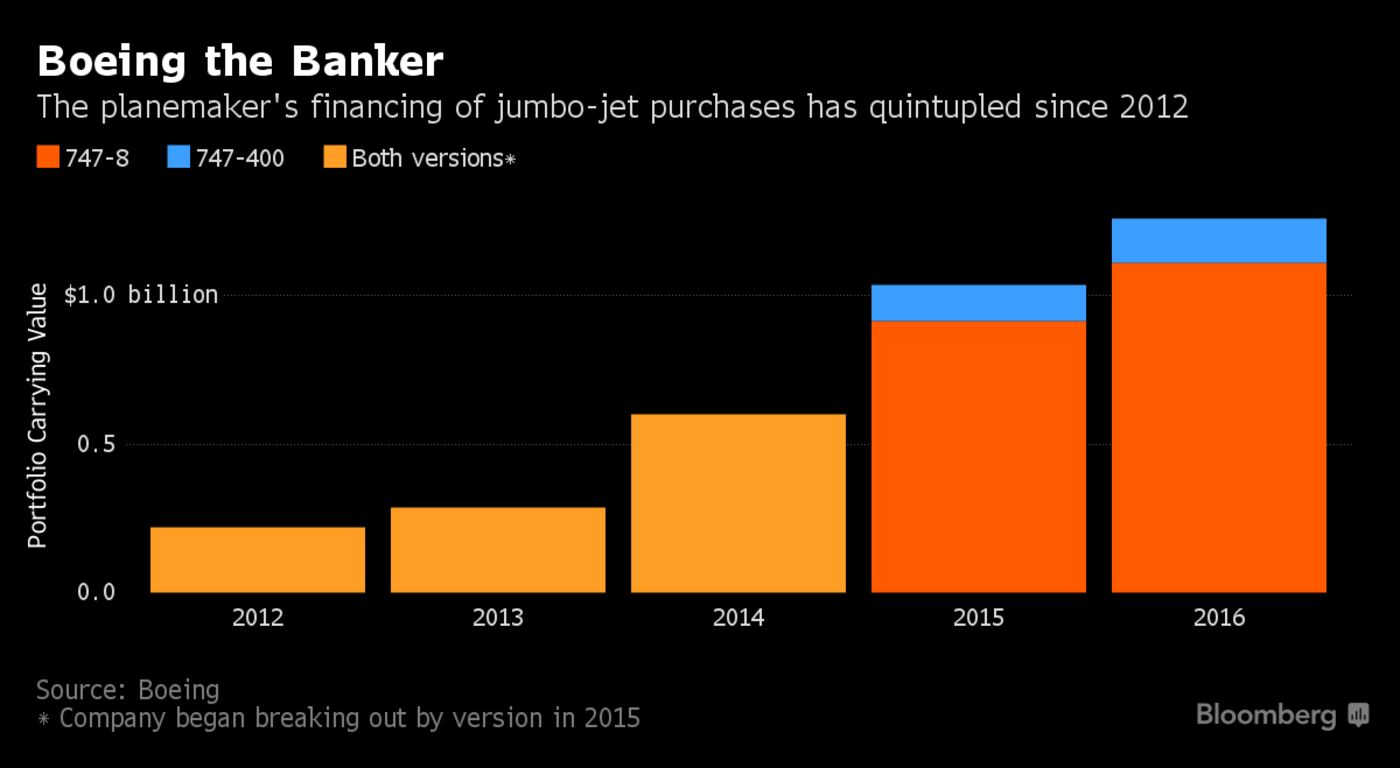With the effective shutdown by Congress of the U.S. Export-Import Bank -- which traditionally has helped overseas carriers purchase planes -- Boeing lost a key sales tool. Making matters worse, leasing companies have been hesitant to finance a plane with a dwindling customer base.
So Boeing is now renting out the massive, hump-backed 747s to cargo carriers in countries such as Russia and Azerbaijan, which increases the company’s exposure to potential defaults on payments.
Through the end of last year, Boeing had provided financing valued at $1.26 billion to 747 customers through Boeing Capital Corp., regulatory filings show. That’s about a fivefold increase from the close of 2012. In fact, 747-related loans and operating leases now account for about one-quarter of the portfolio managed by Boeing’s lending arm.

“We believe in the long-term need for this aircraft,” said George Dimitroff, head of valuations for Flight Ascend Consultancy. “As long as they don’t over-produce, which Boeing aren’t doing at the current rate, we believe there will be long-term demand.”
Boeing recorded more than $2.1 billion in losses on the 747-8, the latest version, in 2015 and 2016 as it slowed production to keep pace with dwindling sales. The company received a big boost last year when UPS ordered 14 of the jumbo freighters and took options that would double the original order size. The sale was the largest Boeing has landed for the redesigned 747 since November 2007, according to the manufacturer’s website.
It’s unusual -- and risky -- for a planemaker to buy and lease its own product on a large scale. If the cargo carriers default or don’t renew operating leases, it would be Boeing Capital’s responsibility to line up other customers, a challenge in a niche market. If the plane experiences a greater-than-expected decline in value, Boeing’s earnings or cash flow could be “materially adversely affected,” according to the filing.
Boeing’s shares were little changed at $177.56 in New York Wednesday. They have gained 14 percent this year through Tuesday’s close.
Stepping In
It’s also a shift for Boeing Capital, which has whittled down its loan portfolio by two-thirds from $12.2 billion at the start of 2004 as the unit shed its ambitions of becoming Boeing’s answer to GE Capital. Since selling the General Electric Co. unit a $2 billion commercial loan portfolio in 2004, Boeing Capital has focused on supporting the company’s aircraft sales and managing a portfolio of loans and operating leases aimed primarily at out-of-production aircraft.
The recent spate of 747-related operating leases isn’t a reversal of that strategy, Timothy Myers, president of Boeing Capital, said in an interview. His division stepped in to close the 747 deals after a financier had difficulty lining up equity, Myers said. With cargo traffic growing, he expects to find buyers for those aircraft.
“We are in the process of doing that right now: offloading some of those transactions that we’ve done in the past,” Myers said. “This year most likely there will be multiple parties taking those assets.”
The Export-Import Bank has been dubbed the “Bank of Boeing” for the backing it has given to aircraft purchases by foreign carriers unable to tap conventional credit markets. But it’s been blocked from providing loan guarantees of more than $10 million because it lacks a board member whose nomination has been stuck in a Senate committee since 2015. Conservative Republicans are opposed to the agency’s mission.
“We may step in and support a few more deliveries,” Myers said. “But what we’re trying to do is find more third-party financiers to do that.”
‘Too Big’
Uncertainty over the global economy and freighter demand are complicating that task. Nippon Cargo Airlines parent Nippon Yusen KK announced March 24 that it was canceling its final two orders of the 747 freighter variant, which has a list price of $387.5 million. Although buyers typically negotiate steep discounts, it was “just too big, too expensive,” said Neel Jones Shah, a consultant who formerly headed cargo operations for Delta Air lines Inc.
While the four-engine 747 is one of the best-selling jets in Boeing’s history, the latest version has struggled to gain sales as airlines shift to more-efficient twin-engine aircraft for long-range flying. The planemaker had a backlog of just 26 unfilled orders through the end of February, 19 of them freighter models, while its order tally for the year stands at two cancellations. There are also five “white tails” -- the nickname for jets built without an airline buyer -- taped up and sitting in storage.
Boeing’s shares were little changed at $177.56 in New York Wednesday. They gained 14 percent this year through Tuesday, the third-biggest advance among the 30 members of the Dow Jones Industrial Average.
To market analysts like George Hamlin, the UPS order is a sign of more deals to come, barring a global recession or other market turmoil. That deal alone could keep Boeing’s 747 in production for another four years.
A generation of older air freighters will soon need to be retired, and the Boeing jumbo has standout technology, from its fuel-efficient engines to nose that flips open to load oversize freight, said the Hamlin Transportation Consulting president.
“UPS is a bellwether or bell cow, whatever term you want to use,” said Hamlin, a former Airbus Group SE executive. “In the intervening time period with UPS bridging the gap, it’s possible other orders may appear.”
Global air freight in January increased by 6.9 percent from a year earlier, down from the 10 percent growth in December but far outpacing the 3 percent average annual pace recorded over the past five years, according to the International Air Transport Association, an aviation trade group.
“The 747-8’s future is closely tied to the cargo market, and we’re keeping a close eye on that segment as it continues to show signs of improvement,” said Randy Tinseth, a Boeing vice president for marketing.
(Julie Johnsson - Bloomberg News)
No comments:
Post a Comment